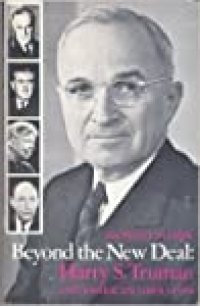
Ebook: Beyond the New Deal: Harry S. Truman and American Liberalism
Author: Alonzo L. Hamby
- Series: Columbia Studies in Contemporary American History
- Year: 1973
- Publisher: Columbia University Press
- Edition: Unknown Binding
- Language: English
- pdf
"The country and the world doesn't deserve to be left this way," was David E. Lilienthal's reaction to the news of the death of Franklin D. Roosevelt and the prospect of the leadership of liberalism in America passing into the hands of the unknown Harry S. Truman.
This book takes a fresh look at the tense and difficult relationship between Truman and the liberal intellectuals. Alonzo L. Hamby discusses changing styes and viewpoints in progressivism and examines the manifestations of that political philosophy as they appeared during the postwar years. He depicts the rise of non-Communist liberalism after the war as both a moral and a practical necessity. The concept of a Popular Front with Communism, predominant during the war years, was salutary so long as the major threat to liberal values was fascist militarism, but as a matter of both moral integrity and political necessity, the postwar era required a definition of progressivism which rejected all varieties of totalitarianism. Professor Hamby argues that the new persuasion, the Vial Center, was in the main a healthy reaffirmation of the progressive tradition.
Harry S. Truman never won full acceptance from a liberal movement unable to overcome entirely its need for the type of charismatic leadership given it by Franklin D. Roosevelt. Nevertheless, he successfully defended the New Deal, making t a part of the American political consensus; he and his administration successfully adjusted the depression-born New Deal tradition to post-war affluence; and he recognized the black minority's drive for civil rights as one of the urgencies of American life. Operating in a hostile political climate, Truman scored only modest successes, but his leadership of the liberal movement was more consistent and effective than ,many liberals of the time or historians since have acknowledged.
This book takes a fresh look at the tense and difficult relationship between Truman and the liberal intellectuals. Alonzo L. Hamby discusses changing styes and viewpoints in progressivism and examines the manifestations of that political philosophy as they appeared during the postwar years. He depicts the rise of non-Communist liberalism after the war as both a moral and a practical necessity. The concept of a Popular Front with Communism, predominant during the war years, was salutary so long as the major threat to liberal values was fascist militarism, but as a matter of both moral integrity and political necessity, the postwar era required a definition of progressivism which rejected all varieties of totalitarianism. Professor Hamby argues that the new persuasion, the Vial Center, was in the main a healthy reaffirmation of the progressive tradition.
Harry S. Truman never won full acceptance from a liberal movement unable to overcome entirely its need for the type of charismatic leadership given it by Franklin D. Roosevelt. Nevertheless, he successfully defended the New Deal, making t a part of the American political consensus; he and his administration successfully adjusted the depression-born New Deal tradition to post-war affluence; and he recognized the black minority's drive for civil rights as one of the urgencies of American life. Operating in a hostile political climate, Truman scored only modest successes, but his leadership of the liberal movement was more consistent and effective than ,many liberals of the time or historians since have acknowledged.
Download the book Beyond the New Deal: Harry S. Truman and American Liberalism for free or read online
Continue reading on any device:

Last viewed books
Related books
{related-news}
Comments (0)